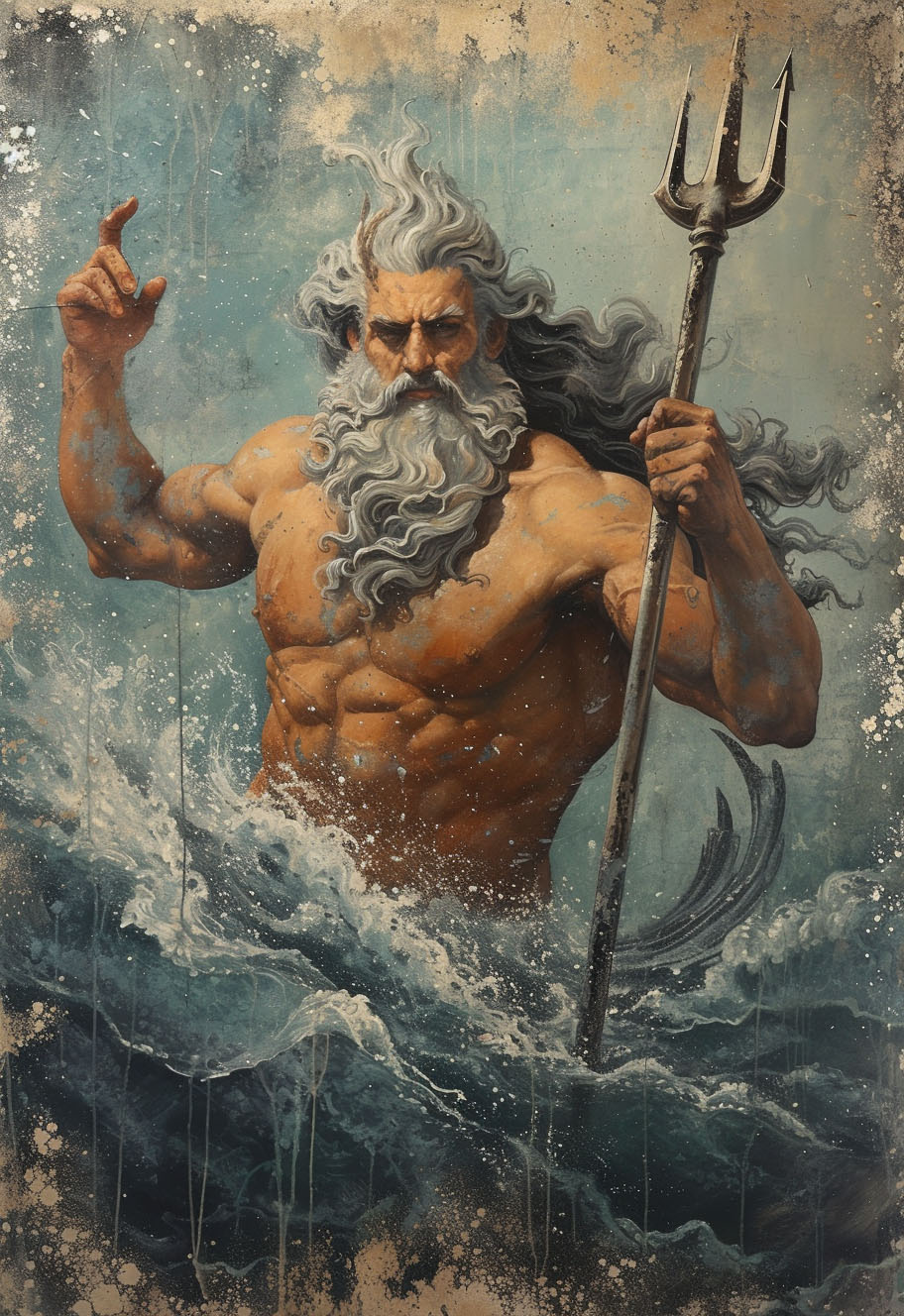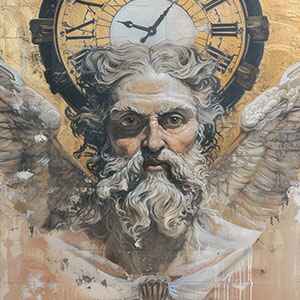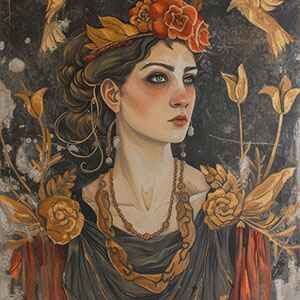Poseidon
In Greek mythology, Poseidon is one of the twelve Olympian deities and the god of the sea, earthquakes, and horses. He is the brother of Zeus and Hades, and like them, he played a significant role in the divine hierarchy. Here are key aspects of Poseidon in Greek mythology:
Parents: Cronus & Rhea
Siblings: Zeus, Hades, Hera, Demeter, Hestia
Consort: NA
Children: Triton, Polyphemus, Pegasus

Parentage: Poseidon is the son of Cronus and Rhea, making him a sibling to Zeus, Hades, Hera, Demeter, and Hestia.
Domain of the Sea: Poseidon is best known as the god of the sea. He rules over the oceans, seas, and all marine life. He is often depicted with a trident, a three-pronged spear that symbolizes his dominion over the waters.
Earthquakes: In addition to his association with the sea, Poseidon is also the god of earthquakes. He is believed to have the power to cause earthquakes by striking the ground with his trident.
Horses and Chariots: Poseidon is often associated with horses. He is said to have created the first horse by striking the earth with his trident. Chariots pulled by divine horses are also sometimes attributed to him.
Role in Mythology: Poseidon is a central figure in various myths. Notable among them is his contest with Athena for the patronage of Athens. He struck the Acropolis with his trident, creating the first saltwater spring, but Athena's gift of the olive tree was deemed more valuable, and she became the city's patron.
Offspring: Poseidon had numerous offspring, often through unions with both divine and mortal beings. Among his notable children are Triton (a sea deity), Polyphemus (the Cyclops from the Odyssey), and Pegasus (the winged horse).
Rivalry with Athena: Poseidon had a longstanding rivalry with Athena, particularly in their roles as patrons of certain cities. Apart from their contest for Athens, Poseidon was considered the protector of seafaring activities and coastal cities.
Odysseus and the Odyssey: Poseidon is a key character in Homer's "Odyssey." He is portrayed as an antagonist to Odysseus due to the hero's blinding of Poseidon's son, the Cyclops Polyphemus.
Cults and Worship: Poseidon was worshipped throughout ancient Greece, with major cult centres in cities along the coast. His festivals, such as the Isthmian Games, were dedicated to him.
Symbols: Poseidon is often depicted with his trident and is associated with the dolphin, which is sometimes portrayed as his sacred animal.
Epithets: Poseidon has several epithets, including "Earth-shaker" and "Tamer of Horses," highlighting his dominion over the sea and his association with horses.
Roman Equivalent: In Roman mythology, Poseidon is identified with Neptune, the god of the sea.
Poseidon's influence extended over both the vast depths of the sea and the earth's stability, as seen in his connection to earthquakes. His character embodies the dual nature of the sea - capable of both serene tranquility and tempestuous power.
Immediate Family
Quick Facts
- He is the god of the sea, earthquakes, and horses.
- Poseidon is the brother of Zeus and Hades.
- He is known for his trident, symbolizing his dominion over the waters.
- Poseidon has the power to cause earthquakes with his trident.
- He is associated with horses and is said to have created the first horse.
- Poseidon had a rivalry with Athena over the patronage of Athens.
- He is a central figure in Homer's "Odyssey," portrayed as an antagonist to Odysseus.
- Poseidon had numerous offspring, including Triton, Polyphemus, and Pegasus.
- He had major cult centers along the coast, and his festivals were dedicated to him.
- Poseidon is often depicted with his trident and is associated with the dolphin.
- In Roman mythology, Poseidon is identified with Neptune, the god of the sea.
- Poseidon's influence embodies the dual nature of the sea - tranquility and tempestuous power.
Further Reading
Art &
Architecture
Ancient Greek art and architecture, with its harmonious proportions and timeless elegance, continue to inspire awe and admiration millennia later.
Discover
Greek Mythology & Mythical Characters
Greek mythology, a rich tapestry of gods, heroes, and mythical creatures, captivates the imagination with its tales of love, betrayal, and epic adventures that delve into the depths of the human psyche.
Discover
Ancient Greek History
Ancient Greek history, marked by remarkable achievements in democracy, philosophy, and warfare, shaped the foundation of Western civilization, leaving an indelible legacy of innovation and cultural influence that continues to resonate to this day.
Discover
Ancient Greek Olympics
The ancient Greek Olympics, held in Olympia every four years, celebrated athleticism, unity, and cultural pride, serving as a testament to the enduring spirit of competition and excellence that transcends time and borders.
Discover
Ancient Greek Wars
Ancient Greek wars, such as the Persian Wars and the Peloponnesian War, were pivotal conflicts that shaped the course of history, highlighting the struggle for power, independence, and the clash of civilizations in the ancient Mediterranean world.
Discover
Ancient Greek Culture and Society
Ancient Greek culture and society, characterized by its emphasis on art, philosophy, and civic engagement, fostered a vibrant intellectual and social landscape where innovation flourished, democracy thrived, and the pursuit of knowledge and excellence was celebrated as fundamental values of civilized life.
Discover

